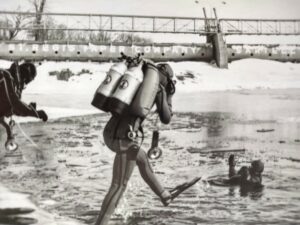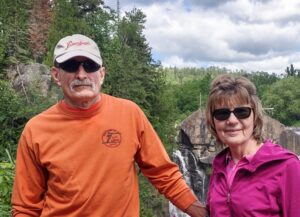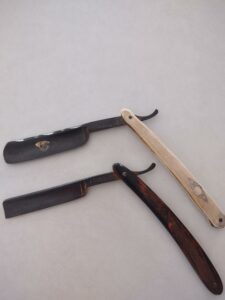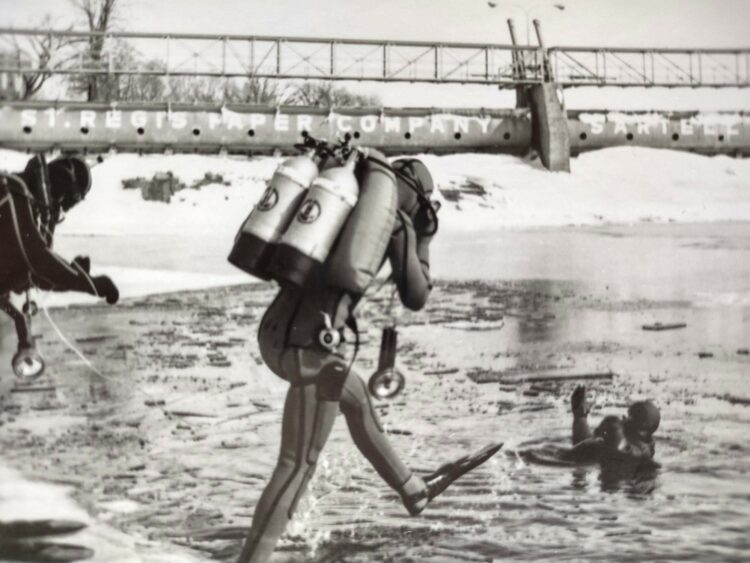by Dennis Dalman
Fifty years ago in the summer of 1973, scuba-diver Richard Schwegel found a mysterious box on the bottom of a Waite Park quarry, and the contents of that box still perplex him.
A long-time St. Joseph resident, Schwegel was born and raised in St. Cloud.
Now and then, he still opens that box and wonders why in the world it contains two very old straight-edge foldable barber razors.
“I saved that box in a junk drawer, and it’s haunted my mind ever since I found it,” he said.
What he found so long ago is a tan-colored metal business cash box, unrusted, 10 inches square and about 4 inches high. When Schwegel surfaced with his “find,” he opened the box to find all kinds of rocks in it. Under the rocks were the two straight-edge razors.
Both appear to be very old, perhaps even from the 19th Century. The older-looking one, its sheathe a tan color, has on it two names: “Dezuller” and “Dozolmer.” Despite research attempts, Schwegel still does not know what Dezuller and Dozolmer mean.
The other one, its sheathe a dark reddish-brown, has the name “Robert Klaas” on it. Through online research, Schwegel learned that Robert Klaas was the name of a maker of high-end cutting instruments, including straight-edge razors. He founded the company in 1834 in Solingen, Germany – a company that still makes cutting tools, including razors.
Down through the years, Schwegel has asked himself again and again: Why would somebody put those two razors in a cash box with rocks in it and then toss it into a quarry? Unless, perhaps, just maybe, could those razors have been used in some kind of grisly crime? Schwegel has resigned himself never to discovering a “why,” although a tantalizing curiosity still tiptoes across his mind.
After graduating from Cathedral High School in 1968, Schwegel joined the U.S. Navy and became a cook. While in the Navy, he also took scuba-diving lessons and began exploring the waters of the Mediterranean Sea. At Naples, Italy, he was a pool lifeguard and would scuba-dive in the bay where a city had sunk into the sea one day in 79 A.D. That was the horrific day the volcano Mount Vesuvius erupted, causing massive devastation, killing at least 1,000 people and plunging part of an ancient city into the sea. That is the same day that the city of Pompei was buried by ash and lava flows. In 1970-71, Schwegel scuba-dived often in that bay above a doomed city there.
“I could see cobble-stone streets, houses and pottery shards inside of the houses,” he recalled.
Back home
After his Navy service, Schwegel returned to his home city of St. Cloud and – still smitten by scuba-diving – he worked part time at a scuba shop in east St. Cloud.
“I’d always wanted to scuba-dive,” he said. “When I was a kid I loved to watch scuba-diving on “Sea Hunt” (TV series). That show was so cool. I loved it.”
After returning to St. Cloud, the St. John’s University graduate landed a job as assistant director of dietetics at the Mayo Clinic in Rochester. While there, he worked part time for two years (1980-82) in a second job – as a deputy for the Olmstead County Sheriff’s Department. In 1982, he and his wife, Darla (Hagen), who’d been a legal secretary in Rochester, moved back to St. Cloud and for the next 12 years he worked as a jail coordinator for Stearns County for six months, then as a road deputy for 12 years. He also did occasional scuba-diving tasks as a deputy, some of which turned out to be very disturbing, such as recovering bodies of drowned victims or in one horrific case, two murdered sisters.
Schwegel said he is often haunted by an image he just cannot erase from his mind – the image of recovering the half-clothed body of 15-year-old Mary Reker, who had been stabbed repeatedly and tossed into a Waite Park quarry. Mary’s sister, Susanne, 12, had also been stabbed to death. Her decomposing body was discovered by two boys on the ground above the quarry. The brutal killings sent shock waves through the St. Cloud area – and beyond.
Reker murders
On Sept. 2, 1974, Mary and Susanne Reker decided to walk the mile or so from their home in St. Cloud to the Shopko and Zayre’s big-box stores to shop for school supplies (the mall where the Byerly’s grocery store is now).
The girls did not return home. Parents, friends and law-enforcement officials began a widespread search, and one of the searchers was scuba-diver Richard Schwegel. The awful fate of the Reker girls was not discovered until 26 days after their disappearance. The crime has not been officially solved, although the girls’ mother, Rita Reker, after years of grief, agony and anguish, was finally convinced she knew who killed her daughters. It was a man who was serving prison time for a similar abduction-stabbing crime and who was dying years later of liver disease in the St. Cloud Hospital.
Two years after the Reker murders, that man (a teenager at the time) and a friend had kidnapped a teenage girl, Suzie Dukowitz, 14, who was working at a north St. Cloud dairy bar. They drove off, later both sexually assaulted the girl, then one of them stabbed her near a gravel pit by Luxemburg and left her for dead. Dukowitz survived the attack. The man convicted of assaulting and stabbing her was sentenced to many years in prison.
Rita Reker visited that man in the hospital some years ago and urged him to admit to the crime, if only for the sake of his conscience. He did not, but that didn’t change Rita’s conviction that he was, in fact, the killer of her two precious daughters.
Many dives
Throughout his life, Schwegel made more than 400 scuba dives, including in the Yucatan Peninsula in Mexico, in the Caribbean Sea near Cozumel (Mexico) and many times in Lake Superior. Most of those dives were for pleasure – not for finding evidence or victims of crimes/mishaps.
Other finds
Way back in the Fishing Opener of 1974, two men were fishing in a canoe just south of the dam in Sartell. With high-river waters in spring caused the canoe to tip. Employees at the paper mill there saw the mishap and managed to rescue one fisherman, but the one slipped beneath the water and did not resurface. For a week or two, the man’s body could not be found.
Schwegel, then 23, donned his scuba gear and jumped into the river, searching, searching. Suddenly, he saw right in front of his face blue bumper tennis shoes and blue jeans.
“I could feel my heart in my throat,” he recalled. “I put a (rope) loop around his body.”
The drowned man was then pulled up to the surface.
Active life
Throughout his life, Schwegel has thrived on public service, volunteerism, church involvement and community projects.
In 1983, he and Sartell resident Daryl Stevens co-founded the Apple Duathlon, an internationally known event that is still going strong every spring in Sartell. At that time, Schwegel was working on health-promotion projects for the St. Cloud Hospital.
He later worked for many years at the St. Cloud Veterans Administration Hospital’s nutrition department and also as its disease-prevention manager and as a patient advocate. At one time, he conducted training sessions for the VA system in cities throughout the nation.
For 14 years, he was the coordinator of the perennially popular “JoeTown Rocks” concert every July 3 in downtown St. Joseph.
Schwegel has been active in law enforcement, along with several relatives. His two sons served as firefighters. Derek was a firefighter for St. Cloud for 19 years, then retired. Blake was a part-time firefighter for three years, also for St. Cloud, then a full-time firefighter for 14 years. After that, he served for two years on the St. Joseph Fire Department.
Richard and Darla have three grown children (Blake, Derek, Krystal), six granddaughters and one grandson.

About 50 years ago, Richard Schwegel (middle) prepares to leap into the Mississippi River below the Sartell dam with other divers while practicing scuba-diving. Note the words on the dam: “St. Regis Paper Company Sartell.” This photo was taken by Darla Hagen, who later married Schwegel.

Richard and Darla Schwegel.

These are the two foldable straight-edge razors that Richard Schwegel found underwater in a cash box 50 years ago. He found the box while scuba-diving in an area quarry.




